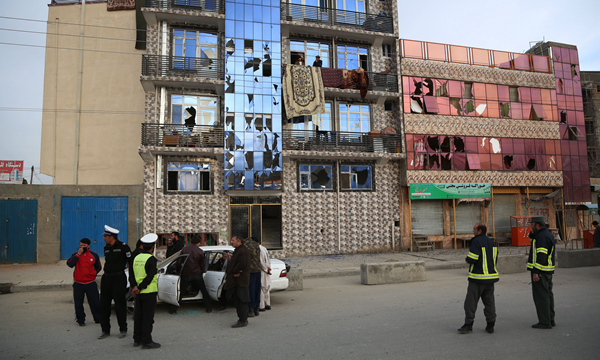Will the new Afghan-US deal stick?
- By Aftab Hussain
 0 Comment(s)
0 Comment(s) Print
Print E-mail China.org.cn, February 29, 2020
E-mail China.org.cn, February 29, 2020

After several rounds of talks between the U.S., the Afghan government and the Taliban, the three parties have agreed to sign a peace deal soon after the“reduction of violence”week.
The U.S.-Taliban peace deal is set to be signed on Feb. 29 in Doha, capital of Qatar. This will be followed by comprehensive talks between the three parties where the Americans and the present Afghan government will mull over a political share in the governmental set-up for the Taliban.
Since the overthrow of Taliban regime in 2001, there have been several ideas floated for achieving long-lasting peace and stability in Afghanistan. These can be divided in three broader categories covering political, military and economic solutions.
There were some who have laid emphasis on a political solution of the whole conflict. This process suggested that all stakeholders be taken on board and consulted in regard to a political settlement, formation of a government and related matter.
The second was military approach, since Taliban and Al-Qaeda were considered enemies and terrorists, hence they should all be totally eliminated to bring peace to the land. Beyond that, there were those who pressed for a solution that focused on economic development to revive a war-devastated country.
In addition to that, several approaches have been stressed that concentrate on what is the best way to end the conflict and broker peace,such as a local approach, regional approach and international approach.
The local approach, obviously, would be purely Afghan-owned and Afghan-led, without any significant involvement by any external actor. It suggested that Afghans should themselves figure out the political solution to their problems.
The second approach was a regional solution. It emphasized that countriesin this region, mainly Afghanistan’s neighbors, should use their influence on the different factions of the militant groups to help them sit down together and thrash out a peace formula.
This was comparatively better solution,but the U.S.wanted to be a part of the process and didn’t want Iran and Pakistan to play any major role. Hence,such effort also failed to yield anything substantial.
The third major approach, the one that was finally adopted, was an all-out international approach, a process to be led by the U.S.,where friendly countries would work together to facilitate the peace process.
In such a process, Saudi Arabia, Qatar, Turkey and Pakistan played a major role to arrange meetings between Taliban leaders and the Americans.
The peace deal between the U.S.and Taliban is a positive step and may help improve the overall situation. However, what is actually needed is a combination of both political and developmental approaches working in parallel.
The first step should be to stop people from joining the Taliban and strengthening enemy forces. This can only be done by addressing the grievances of the people. If people are secure, have jobs or opportunities for work, and access to health and education,they will have less and less reason to complain and join the ranks of any enemy, i.e. Taliban.
This approach will have political dividends. Similarly, the conflict resolution approach can be adopted for parts where there is density of people who are against peace, such as Taliban and other groups.
The peace efforts are well appreciated. However, if the“reduction of violence”week passes peacefully and if the Taliban are able to contain other militant groups in Afghanistan threatening instability, as they have promised,that will be the real achievement for the people of Afghanistan.
The instability in the country is hurdle for regional development, and, if overcome, will have immense benefits for the neighboring countries. The U.S.is looking forward for a respectable withdrawal, and the deal with Taliban provide them with the opportunity.
Aftab Hussain is a PhD scholar at East China Normal University, Shanghai.
Opinion articles reflect the views of their authors, not necessarily those of China.org.cn.
If you would like to contribute, please contact us at opinion@china.org.cn.






Go to Forum >>0 Comment(s)